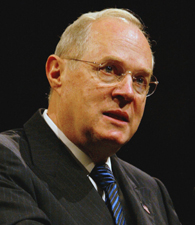Called someone who “may arguably be the single most influential arbiter of domestic policy in the land,” Justice Anthony Kennedy has relished his role as a swing vote at the center of Supreme Court decisions since 1988.
Anthony Kennedy’s Early Days
Anthony McLeod Kennedy was born on July 23, 1936, in Sacramento, California. His father, Anthony, was a lawyer and his mother, Gladys, was active in public service. Anthony inherited his mother’s civic spirit and his father’s dedication to government and law. His love for the law was put into action at the young age of 11, when he began working as a page for the state Senate.
After graduating from Stanford University, Kennedy went on to receive his law degree from Harvard University. Following law school, he worked for a San Francisco law firm. When his father died unexpectedly in 1963, Kennedy took over his private practice, where he remained for 12 years. He also taught constitutional law at the University of the Pacific for 23 years.
Sources in this Story
- PBS: The Supreme Court: Anthony McLeod Kennedy
- The New Yorker: Swing Shift
- Academy of Achievement: Anthony M. Kennedy
- The Washington Post: Decider on the High Court
- The New York Times: Anthony Kennedy Is Ready for His Close-Up
- PennLive.com: The Supreme Court’s maverick could be President Trump’s worst nightmare: John L. Micek
- The New Republic: Supreme Leader: The Arrogance of Anthony Kennedy
- American Bar Association: Justice Anthony M. Kennedy to Receive American Bar Association Medal for 2007
- Slate.com: Will He or Won’t He?
Kennedy’s Judicial Career
In the mid-1970s, Kennedy became acquainted with California Governor Ronald Reagan. Based on Reagan’s recommendation, President Gerald Ford appointed Kennedy to the United States Court of Appeals for the Ninth Circuit in 1975. During this time, he also worked as the supervisor for the territorial courts in the South Pacific, which nurtured his love for foreign travel and international affairs.
Kennedy was appointed to the Supreme Court under fortuitous circumstances. He was President Reagan’s third choice to fill a vacancy on the court; the president’s first choice, Robert Bork, was rejected by the Senate due to conservative ideology, and a second withdrew himself after reports of past drug use surfaced. The Senate, after intensely scrutinizing Kennedy and his record, confirmed him unanimously in 1988.
Kennedy has eschewed an all-encompassing conservative ideology in favor of a more individualized approach to each case. Kennedy has sought to form a bridge between the liberal and conservative factions of the court and create a national consensus.
In a 2005 interview with the Academy of Achievement, Kennedy explained, “Sometimes people think compromise means squishy, centrist. It doesn’t. The whole idea of a democratic society is that there must be a consensus, and it’s a consensus that should be based on rational dialogue…We must be a society that has a broad consensus on certain very fundamental values.”
As the swing-vote on many close cases, Kennedy has perhaps been the most influential member of the court over the last two decades and “arguably be the single most influential arbiter of domestic policy in the land,” writes Washington Post columnist David Broder.
He has played a decisive role in cases, including military commissions for detainees, gay rights, police powers, abortion, environmental regulation and affirmative action, and he was a chief author of the 2000 Bush v. Gore election case, as well as Obergefell v. Hodges, which legalized same-sex marriage nationwide.
He has often been criticized by both the left and right for his unpredictable voting patterns. Some have criticized him for his estimation of the power of the Supreme Court; he told the Academy of Achievement that he believes justices have an “opportunity to shape the destiny of this country.”
“From the beginning, Kennedy’s performance on the Court has been defined not by indecision but by self-dramatizing utopianism,” writes Jeffrey Rosen in The New Republic. “He believes it is the role of the Court in general and himself in particular to align the messy reality of American life with an inspiring and highly abstracted set of ideals. He thinks that great judges, like great literary figures, have both the power and the duty to ‘impose order on a disordered reality.’”
Still, Kennedy has earned praise for being unconstrained by partisan ideologies and taking each case on its individual merit. Broder writes, “Kennedy was exactly what Reagan thought—‘a true conservative’ and ‘a courageous, tough, but fair’ jurist.”
The Rest of the Story
Aside from his highly influential position on the Court, Kennedy also continues to enjoy teaching. Every summer, he returns to Salzburg, Austria, to teach constitutional law at McGeorge School of Law’s Summer Institute.
In 2007, he received the American Bar Association’s highest honor: the ABA Medal. “He is a fighter for justice and an advocate for all—an example for every judge, every lawyer and every law professor, not just in America but all over the world,” said ABA President Karen J. Mathis.
Justice Kennedy resigned from the Court effective July 31, 2018. In his resignation letter, he wrote, ““it is the highest of honors to serve on this Court. Please permit me by this letter to express my profound gratitude for having had the privilege to seek in each case how best to know, interpret, and defend the Constitution and the laws that must always conform to its mandates and promises.”











